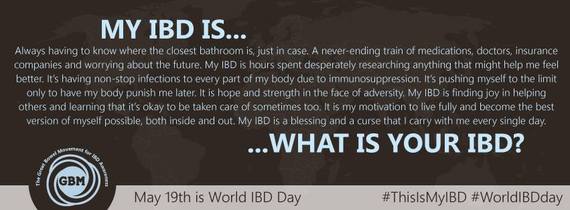May 19 was World Inflammatory Bowel Disease (IBD) Day and yet I am not feeling optimistic or positive like I would normally. Instead I am feeling defeated -- defeated by the lack of progress made over the past 365 days toward ascertaining a public understanding of these digestive diseases. I feel defeated by the lives lost over the past year to these diseases, including most recently a beautiful, vivacious 20-year-old. I feel defeated by how much pain and suffering I've witnessed my friends go through over the past year because of Crohn's disease and ulcerative colitis. I feel defeated because people still think of these diseases as just "bathroom diseases." Most of all, I feel defeated because there still isn't a cure and yet people seem to think that's not the truth.
In the United States, there are more than 1.4 million people living with Crohn's disease and ulcerative colitis, the two main diseases that fall under the umbrella of inflammatory bowel diseases (IBD). According to the Mayo Clinic, Crohn's disease causes inflammation anywhere along your digestive tract and ulcerative colitis causes inflammation in primarily the large intestine (colon) and rectum. Both diseases cause debilitating abdominal pain, diarrhea, malabsorption, and malnutrition.
In the seven years that my husband has had Crohn's disease, I have seen the best and the worst of it. I have seen him so fatigued from his medication that he's struggled to get out of bed to go to the bathroom. I've seen him keeled over in the parking lot of our apartment building in pain, unable to get into my car to go to the emergency room. I've seen him with a nasogastric tube down his nose, throat and into his stomach suctioning the contents of his stomach into a bucket. I've seen him struggle to cough, laugh and walk for months after having part of his intestines surgically removed. I've seen him thoroughly inspect his food to make sure there were no seeds, skin, pits, roughage, nuts or anything else smaller than his pinky nail to prevent a blockage. This is not how someone should have to live.
The sad thing is that my husband lives with a milder to moderate form of Crohn's disease. I know many people who have had it much worse. There's Brian, who has had over 30 surgeries to treat his Crohn's disease and is preparing for another major one this summer. There's Kelly who had surgery last July to remove the remainder of her colon and rectum and is still healing, almost 11 months later. There's Piper, who is 10 years old, and, while her peers are able to run around carefree, she has to monitor what she eats, take heavy duty medications and steroids and hope to not wind up in the hospital because of her disease. There's Sara who just spent three months in the hospital and is now receiving most of her nutrition intravenously. There's Marisa who, as a result of having ulcerative colitis, suffers from several other conditions including post-traumatic stress disorder. And of course, there's Alexandria, a beautiful 20-year-old girl from Georgia who, after having eight bowel resections, was left with short gut syndrome, causing her to be unable to absorb nutrients. Sadly, she passed away last week due to complications from Crohn's disease.
When people hear about Crohn's disease and ulcerative colitis, they do not hear these stories. However, to get a full understanding of how serious these diseases are, it's essential that these stories are shared. The pharmaceutical companies paint a picture of Crohn's disease and ulcerative colitis as "bathroom diseases," as if urgency is the only factor when it comes to IBD. While urgency is a part of these diseases, it isn't the only part. It's a sad fact that the very companies that manufacture the medications that treat these illnesses don't even have a full grasp on how all-encompassing these diseases are.
It's not just the pharmaceutical companies that portray it wrong -- it's just about everyone. People consistently state that there is a cure for IBD -- that they cured their disease by altering their diet or meditating or using other holistic means. When people try to refute it by saying there is no cure for Crohn's disease and no cure for the underlying inflammatory condition that causes ulcerative colitis, people get angry, defensive and nasty.
Earlier this month, Fox News ran a piece in which a reader asked for tips on coping with irritable bowel syndrome (IBS) by altering their diet. Fox's resident doctor responded by saying,
Irritable bowel syndrome (IBS) is a chronic condition that affects the gastrointestinal (GI) tract. The two most common diseases under the "IBS umbrella" are ulcerative colitis and Crohn's disease.
Dozens of patients with IBD reached out to Fox, asking them to correct the story and issue an apology. Several days later, after the piece had opportunity to be seen by virtually anyone, the article was corrected. However, no apology was ever issued for the huge error on Fox's behalf for not fact checking and thus trivializing the severity of these diseases.
In order to make a real difference, we need to stop sugar coating everything. We need to share our stories and the basic fact that Crohn's disease and ulcerative colitis are serious, debilitating, sometimes fatal diseases that are not the same as irritable bowel syndrome and are more than just bathroom diseases.
I hope that by next World IBD Day, these are the facts that people know about inflammatory bowel disease. If that's the case, then we will be in a better place. But until then, I am not holding my breath.
